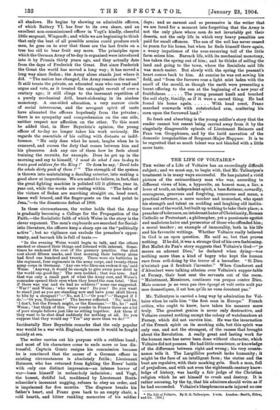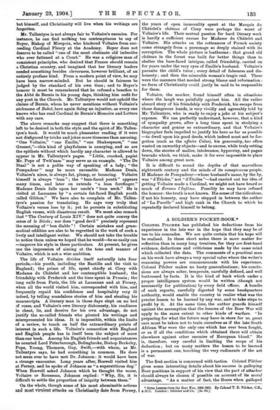THE writer of a Life of Voltaire has an exceedingly
difficult subject ; and we must say, to begin with, that Mr. Tallentyre's treatment is in many ways successful. He has painted a vivid picture of the extraordinary man who was, according to different views of him, a hypocrite, an honest man, a liar, a lover of truth, an independent spirit, a base flatterer, cowardly, courageous, generous and forgiving, rancorous and mean, a practical reformer, a mere mocker and iconoclast, who spent his strength and talent on scolding and laughing old institu- tions out of the world, but built up nothing to take their place; a preacher of tolerance, an intolerant hater of Christianity, Roman Catholic or Protestant; a philosopher, yet a passionate egotist and malicious hater and persecutor of those who offended him; a moral teacher ; an example of immorality, both in his life and his favourite writings. Whether Voltaire really believed in God is an open question. He said so, but that proves nothing. If he did, it was a strange God of his own fashioning. But Mallet du Pan's story suggests that Voltaire's God—" je meurs en adorant Dieu," he declared when dying—was nothing more than a kind of bogey who kept the human race from evil-doing by the terror of a hereafter. "Si Dieu n'existait pas il faudrait l'inventer." When Condorcet and d'Alembert were talking atheism over Voltaire's supper-table at Feriaey, their host sent the servants out of the room. " Maintenant, Messieurs, continuez vos propos contre Dieu. Mais comme je ne veux pas e'tre egorge et vole cette unit par mes domestiques, il est bon qu'ils ne vous ecoutent pas."
Mr. Tallentyre is carried a long way by admiration for Vol- taire when he calls him "the first man in Europe." French critics, who ought to know, have taken his measure more truly. The greatest genius is never only destructive, and Voltaire created nothing except the colony of watchmakers at Ferney, which did not survive him. He was the incarnation of the French spirit on its mocking side, but this spirit was only one, and not the strongest, of the causes that brought about the Revolution. A really great and lasting work for the human race has never been done without character, which Voltaire did not possess. He had little conscience, or knowledge of the difference between right and wrong ; his very counte- nance tells it. The Largilliere portrait lacks humanity ; it might be the face of an intelligent faun ; the statue and the bust are repulsive, with their mocking grin. Such a man, full of prejudices, and with not even the eighteenth-century know- ledge of history, was hardly a fair judge of the Christian religion which he set himself to crush and destroy. It is rather amusing, by the by, that his admirers should write as if he had succeeded. Voltaire's blasphemous acts injured none • The Life of Voltaire. By S. G. Tallentyre. 2 vols. London : Smith, Elder. and CO. [21s.]
Mr. Tallentyre is not always fair to Voltaire's enemies. For instance, he can find nothing too contemptuous to say of Boyer, Bishop of Mirepoix, who hindered Voltaire from suc- ceeding Cardinal Fleury at the Academy. Boyer does not deserve to be called "one of the most obstinate old imbeciles who ever fattened at a Court." He was a religious man of consistent principles, who desired that France should remain a Christian country, and imagined that her literary leaders needed something besides cleverness, however brilliant, of an entirely profane kind. From a modern point of view, be may have been narrow-minded. But he should in fairness be judged by the standard of his own time ; and to Boyer's honour it must be remembered that be refused a benefice to the Abbe de Bernis in his young days, thinking him unfit for any post in the Church. Mr. Tallentyre would not uphold the claims of Bernis, whom he never mentions without Voltaire's nickname of Babet, here again doing an injustice, as every one knows who has read Cardinal de Bernis's Memoirs and Letters with any care.
The above remarks may suggest that there is something left to be desired in both the style and the spirit of Mr. Tallest- tyre's book. It would be much pleasanter reading if it were not disfigured by tricks and jokes more tiresome than amusing. "One Voltaire," "one Emilie," "one Shakespeare," "one Gresset,"—this kind of playfulness is annoying, and so are the epithets without which hardly any character is allowed to appear in Mr. Tallentyre's pages. "Little, crooked, papist Mr. Pope of Twit'nam " may serve as an example. "The Be Steal" is not a polite way of speaking of a lady ; "the Pompadour" may be more excusable. Madame Denis, Voltaire's niece, is always fat, plump, or bouncing. Voltaire himself is always " lean" ; the "lean-faced youth" appears many times, and later on extends "a lean forefinger." Madame Denis falls upon her uncle's "lean neck." He is visited at Lausanne by "a certain fat-faced English youth 'Jailed Gibbon." We have also to complain of Mr. Tallest- lyre's passion for translating. He says very truly that Voltaire's verses lose by it; yet he persists in substituting English verses, with disastrous result. We must also remark that "The Century of Louis XIV." does not quite convey the sense of le &Me; nor does "good devil" precisely represent the meaning of "bon diable "I Certain mistakes and gram- matical oddities are also to be regretted in the work of such a lively and intelligent writer. We should not take the trouble to notice them unless we hoped that he would—he so easily can —improve his style in these particulars. At present, he gives one the impression of aiming at the tone and manner of Voltaire, which is not a wise ambition.
The life of Voltaire divides itself naturally into four periods,—his youth, including the Bastille and the visit to England; the prime of life, spent chiefly at Cirey with Madame du Chitelet and her contemptible husband ; the friendship with Frederick and the time spent in Prussia; the long exile from Paris, the life at Lausarme and at Ferney, when all the world visited him, corresponded with him, and frequently repaid his confidence and hospitality very ill indeed, by telling scandalous stories of him and stealing his manuscripts. A literary man in those days slept on no bed if roses, and Voltaire's own literary dishonesty, his readiness to cheat, lie, and deceive for his own advantage, do not justify the so-called friends who pirated his writings and misrepresented his ideas. It ip impossible, within the limits of a review, to touch on half the extraordinary points of interest in such a life. Voltaire's connection with England and English people has in itself been the subject of more than one book. Among his English friends and acquaintances he counted Lord Peterborough, Bolingbroke, Bishop Berkeley, Pope, Young, Thomson, Gay, Swift,—with whom, as Mr. Tallentyre says, he had something in common. He does not seem ever to have met Dr. Johnson: it would have been a strange encounter. Long years after, Boswell visited him at Ferney, and he spoke of Johnson as "a superstitious dog." When Boswell asked Johnson which he thought the worse, Voltaire or Rousseau, Johnson replied : "Why, Sir, it is difficult to settle the proportion of iniquity between them."
On the whole, though some of his most abominable actions mid most virulent attacks on Christianity date from Ferney,
the years of open immorality spent at the Marquis du Chatelet's château of Cirey were perhaps the worst of Voltaire's life. Their mutual passion for hard literary work is hardly a sufficient excuse for Madame du Chatelet and Voltaire. His attacks on the rottenness of French society come strangely from a personage so deeply stained with its corruption. The whole picture is loathsome : that grand old château in the forest was built for better things than to shelter the bare-faced intrigue, called friendship, carried on for years under the very eyes of Emilie's husband. Voltaire's parasite the child's tutor ; every detail of falseness and dis- honesty; and then the miserable woman's tragic end. These were the manners that needed strong blame and reformation : no form of Christianity could justly be said to be responsible for them.
Voltaire, the mocker, found himself often in situations where the laugh was painfully against him. All the rather absurd story of his friendship with Frederick, his escape from those dangerous hands, is very vividly and agreeably told by Mr. Tallentyre, who is ready to enjoy a joke at his subject's expense. We can perfectly understand, however, that a kind of sympathy grows, after a long time spent in studying a character and genius so extraordinary, and that Voltaire's biographer feels impelled to justify his hero as far as possible —to dwell upon his good deeds, which indeed must not be for- gotten (such as the affaire Calms), his generosity, too often wasted on unworthy objects—and to excuse, while truly setting down, the stories of malice, intolerance, hypocrisy, and pagan bravado which, we think, make it for ever impossible to place Voltaire among great men.
It is difficult to sound the depths of that marvellous eighteenth century and the minds of its conspicuous people. If Madame de Pompadour—whose husband's name, by the by, was " d'Etioles," not " d'Etoiles "—had carried out her idea of getting Voltaire made a Cardinal, we might not have heard so much of Ecrasez l'Inflime. Possibly he may have refused the honour: the truth is not known. His sense of the ridiculous, if not his honesty, may have stepped in between the author of "La Pucelle " and high rank in the Church to which he repeatedly declared himself to belong.











































 Previous page
Previous page